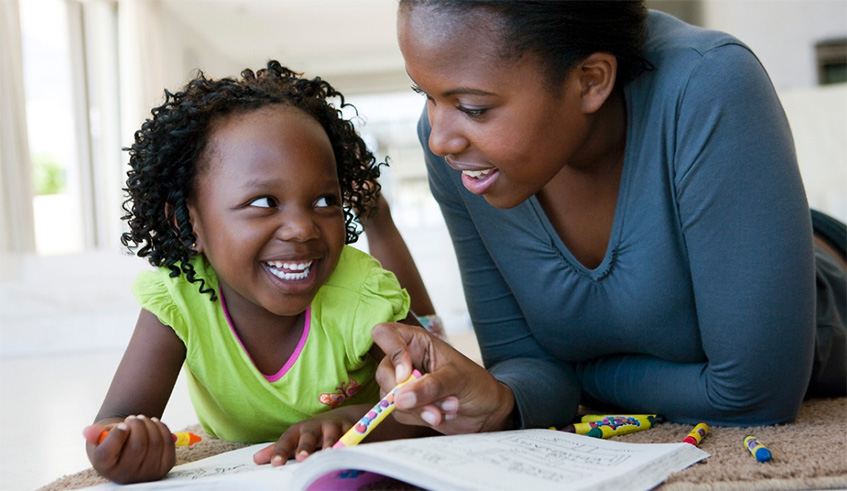

Granted, teachers do their best to make sure students excel and turn into responsible people in society; however, they cannot give all the support required on their own. Parents need to be part of the teaching, grooming, counselling process needed for students to excel and reap from education.
Parental involvement is a combination of commitment and active participation. It produces measurable gains in students’ achievements.
Beatrice Musiimenta, a teacher at Wellspring Academy, Nyarutarama, says that parental involvement means knowing where a child’s education journey is heading to and being part of the highs and lows along the way.
She says that parents’ involvement in their children’s education shows learners that they (parents) care about their education, which makes them (students) appreciate the importance of learning and helps them understand the purpose of why they are in school.
Knight Kuta, a teacher at Mai Childhood Academy, Nyamirambo, says parental participation leads to better classroom behaviour and has a positive influence on students’ attitude and behaviour. A parent’s interest and encouragement in a child’s education can change the child’s attitude towards school, classroom conduct, absenteeism and motivation.
Children, whose parents stay involved are more likely to have higher self-esteem, be disciplined, have more self-motivation and achieve better grades, Musiimenta adds.
Kuta explains that parental involvement lifts teachers’ morale. Parents develop greater appreciation for the challenges that teachers face in the classroom. This helps teachers improve their drive towards schooling.
"Parents’ involvement in academics benefits children and parents. Being actively involved in a child’s education journey gives them motivation. Active involvement also gives parents a better understanding of the school curriculum and activities, which makes them more comfortable with the quality of education their child is receiving,” she notes.
Kuta says that reading with children greatly improves their analytical skills. Reading aloud to a child contributes significantly to their own reading ability.
Vincent Niyibizi, a language teacher at Ecole Secondaire Munzanga, Karongi, says when parents are engaged in their children’s school life, scholars have the support needed to finish their assignments, and develop a passion of learning.
He adds that, in education, there are three important partners; teachers, students and parents. Parents play a big role in the learning and teaching process because they do not just provide school fees. Parents inspire children essentially, therefore, without their support or involvement, children will feel left out or miss out on important values.
Niyibizi explains that parents are the ones who provide a conducive environment at home and this enhances the performance of a student. For instance, the day-to-day follow up, like checking on the child’s homework and making sure all assignments are done and corrections are made.
He says that if possible, parents should meet teachers to talk about the child’s strengths and weaknesses. Find ways to solve problems with the teacher but also, give students credit and encouragement when they do well. Busy parents will lack the time to know what their children are good at.
"While teachers can advise parents on some issues, parents also have important information about their children that teachers might not know. Both can bring perspectives to the table that enrich a student’s learning experience,” Niyibizi says.
Issa Kiyingi, an English and literature teacher at CCI-Essi-Nyamirambo, says that parents play a vital role as far as their children’s performance or studies are concerned, such as, disciplining and nurturing a child, and protecting the child through guidance and counselling.
He says that parents also help to inspire children and may influence them in decision making, sometimes through career choices based on their aspirations.
Kiyingi says that if a parent is concerned about their child, the performance improves since there is follow-up. Parents should follow up on goals set by students, and provide the necessary equipment for the improvement of their performance.
Kiyingi also says that frequent visits to the school to follow-up on the student’s studies or discipline at school is necessary, especially for those in boarding school.
Even when teachers do a lot to boost students’ performance, some parents weaken this performance by being reckless, lazy, undisciplined, and abusive.
"Also, some students go to school hungry, and in the end, studying becomes a burden to the child,” he explains.
Sarah Kabiswa Nakiberu, a teacher at Green Hills Academy, Nyarutarama, says that many parents have given up their role in educating and raising children. Research has shown that parent involvement in a child’s education process contributes massively to the desired learning outcomes.
Nakiberu says that a good parent-child connection is seen in their speaking, listening, reading and comprehension, even before they have any formal contact with teachers in a school setting.
"Furthermore, parent involvement promotes children’s motivation and persistence in the challenging educational tasks. If a parent is aware of the teacher’s goals, they may provide resources and support for the child’s learning,” she notes.
Nakiberu adds that when teachers realise that a parent is involved in the child’s education process, their morale is lifted. They are assured that they can rely on the parent for support in the child’s learning.
Parental involvement in the child’s learning is a gift that money cannot buy. All parents, regardless of their status, ought to take part in their children’s education process. It is the ultimate fulfilment a parent earns for making a difference in their children’s education, she says.
Alexandrie Keza, a mother and a resident of Kibagabaga, says that in order for parents to take part in their children’s academic lives, they should exchange contacts and emails with the child’s teachers so that they have updates on school activities that require them to be present for any issues to be discussed to enable the child perform well.
Keza notes that parents should keep in touch with teachers, and feel free to ask any questions regarding their children’s performance, as this provides opportunities for parents to connect with the school, volunteer in class activities and parent-teacher committees.
She adds that teachers ought to share classroom goals and expectations openly with parents, and vice versa. Connect with parents’ in-person as much as possible. Tackle common challenges that interrupt appointments with the school.
John Bosco Otim, a teacher at Nu-Vision High School, Kabuga says, "Each day of our lives as parents, we make deposits in the memory banks of our children, the three major stakeholders in the academic success are the student, the teacher (and the entire school environment) and the parent (home and community). These three must execute their responsibilities for the desired learning outcomes.”
Helping students to make a school time-table for extra studies, providing proper nutrition, medication and enhancing discipline, are some of the practices of good parenting, he says.
He says that parents need to be actively involved in the decision making process with issues regarding their children. Many parents leave this very important role to the student, their peers and sometimes, even strangers. Choosing which school to attend, combinations at A level, future careers, university courses, among others, are some of the very critical decisions that parents must be involved in.
Otim explains that parents should get involved in parent-teacher associations, school management committees, alumni associations, and many others, as these are the major decision making organs of a school.
He adds that parents need to establish a proper channel of communication with the learner, the teachers and the school. Schools usually communicate with parents through progressive report cards, letters to parents, PTA general assemblies, or open school days.
These channels of communication enable parents to follow up on their children’s academic progress. At Nu-Vision High School, for instance, consultation days are organised, where parents, teachers and learners meet face-to-face to discuss learners’ academic progress, Otim says.
"In my own experience in the education system of Rwanda spanning over 10 years, I have observed that learners whose parents are actively engaged in their education attain better grades, get enrolled in the more challenging education programmes, have positive behaviour, and portray better socialisation and life skills,” Otim says.
editorial@newtimes.co.rw


